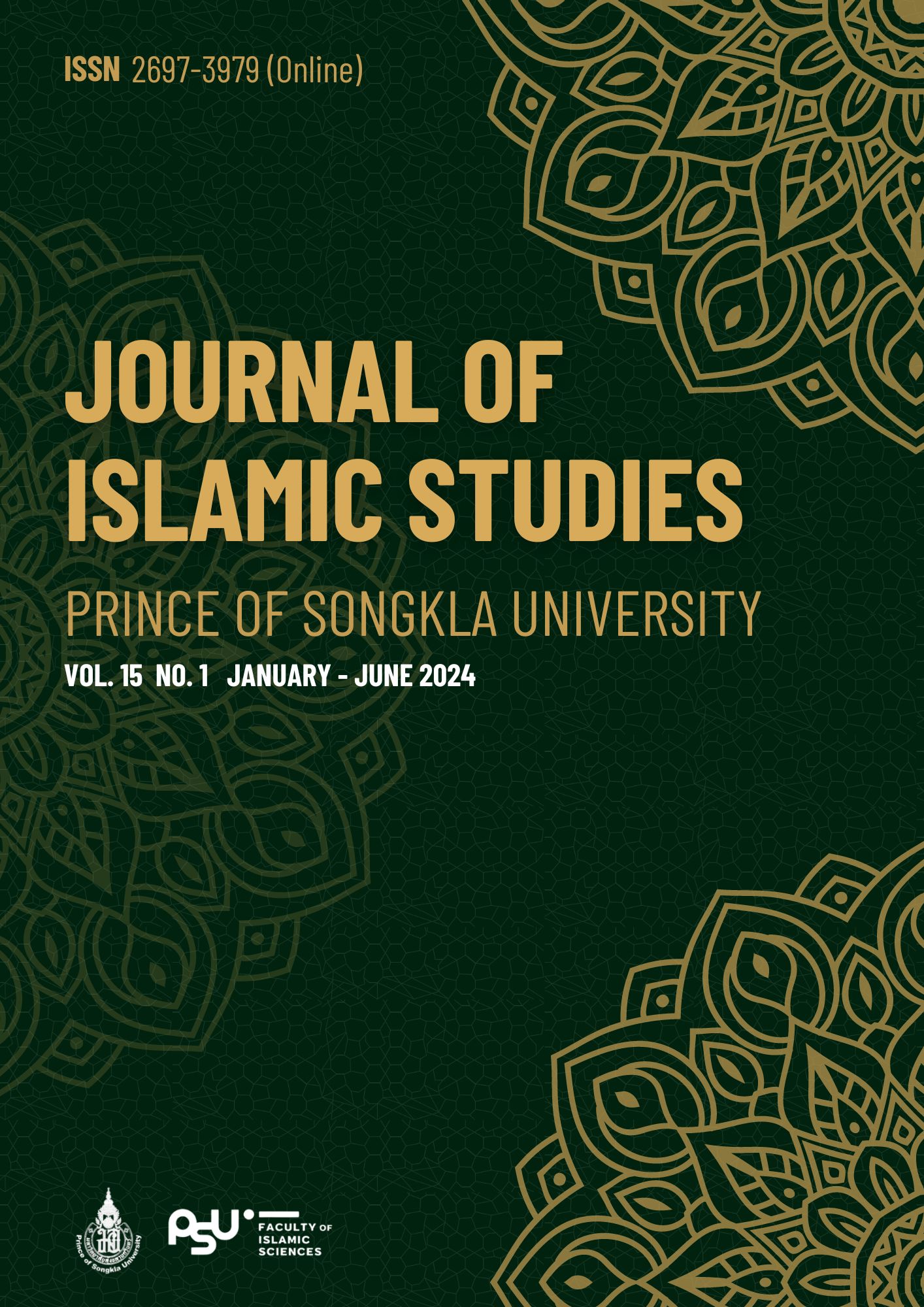Intercultural Beliefs in the Religious Practices of Muslims in Koh Samui District Surat Thani Province
DOI:
https://doi.org/10.14456/jois.2024.8Keywords:
Beliefs, Peace Culture, Muslim Community, Samui IslandAbstract
Objectives: To study the history and beliefs of different cultures that lead to the practice of worship of the Muslim community in Koh Samui District, Surat Thani Province.
Methodology: This research is qualitative combined with the method of document research by the researcher, divided into 2 steps: 1) study of documents regarding the history and development of distorted ideas and practices of the Muslim community. In Koh Samui District, Surat Thani Province. 2) Data collection from in-depth interviews (IDI) and focus group discussions (FGD) with religious scholars, Imam Khatib, Bilal, Sabbath, Tadika teachers, and Dawa group and the public. A total of 20 people were instructed to answer the research objectives.
Research findings: History and beliefs of different cultures that lead to the practice of Ibadah among Muslim communities in Koh Samui District, Surat Thani Province, begins with a practice that has been passed down since the time our ancestors immigrated to Koh Samui. It has distorted characteristics from various beliefs, including Buddhism, Hinduism, and Islam, causing the development of concepts, understandings, and practices that are distorted from Islamic provisions, since the migration of people staying on Koh Samui, such as making merit on a boat ceremony Birth ritual (Tobidae) Takrud ritual talismans Itsukubor - Arawah ritual, and the Kubor (cemetery) guarding ritual. However, at present the Muslim community in Koh Samui district has received development in knowledge and education, because there are religious experts who travel from foreign countries to provide knowledge and recommend correct teachings. This allows Muslims in the community to gain knowledge and understanding and be able to adhere to correct Islamic practices.
Contribution: This study is considered important basic information to support awareness for the Surat Thani Provincial Islamic Committee. Organizations for spreading Islam in Thailand and related agencies saw the importance and took part in presenting appropriate guidelines for changing distorted ideas into correct principles of practice in the Muslim community in Koh Samui District, Surat Thani Province.
References
Ammaphan, S. (1993). Traditions and rituals in Thai literature. O.S.Printing House Co., Ltd.
Al-Usama, A. (2007). The Beliefs of Muslims in Magic, Witchcraft and Soothsaying: A case Study of Yaring, Pattani[Unpublished master’s thesis]. Prince of Songkla University Pattani Campus.
Chalayondecha, P. (1996). Muslims in Thailand(2nd edition). Islamic Central Library Project, Sultan Sulaiman lineage.
Hooker, M. B., & Saenong, Ilham B. (2002). Islam mazhab Indonesia: fatwa-fatwa dan perubahan sosial/M.B. Hooker; penerjemah, Idin Rosyidin Hasan; editor, Ilham B. Saenong. Teraju.
Jitphiromsri, S. (2002). Beliefs rituals and traditions in the Sai Khao community. Khok Pho District Pattani Province (Research Report). The Research Supported by Faculty of Humanities and Social Sciences, Prince of Songkla University Pattani Campus.
Khumparat, N. et al. (2010). Foreign Culture, The Changes in Dynamics to The Social and Cultural Aspects of the Communities Koh Samui and Koh Phangan District Suratthani Province(Research Report). The Research Supported by Office of the National Culture Commission.
Kongsamut, S. (2012). Vipassana Master of Sriwichai Island. Thammasathaporn Publishing House.
Muslim, M. (1991). al-Ṣaḥīḥ (الصحيح). Dār al-Ḥadīth.
The Office Strategy Management: OSM. (2016). Southern Provinces Development Plan on the Gulf of Thailand (2018 - 2021). OSM.
Ponsawat, S. & Thipyasothon, P. (2014). The Formulation a Samui Vernacular Architecture Model. Conference proceedings: The 15th Graduate Research Conferences, Graduate School, Khon Kaen University.
Ruangprach, C. (2004). Bilief and Feast Customs Amongst Muslim in Ayutthaya [Unpublished master’s thesis]. Prince of Songkla University Pattani Campus.
Saksoong, A., & Chaunchaiyasit. P. (2018). Tok Bidan’s way of life: the preservation of folk wisdom and community culture in areas of deep south provinces, Thailand. Intaninthaksin Journal Thaksin University, 13(1). 31-53.
Sornpradt, C., & Yisa, K. (2005). Thai Muslim Community in SuratThani. Office of the National Culture Commission. Ministry of Culture.
Sumpena, D. (2012). Islam dan Budaya Lokal:Kajian terhadap Interelasi Islam dan Budaya Sunda. Ilmu Dakwah Academic Journal for Homiletic Studies, 6(1), 101-120. DOI: https://doi.org/10.15575/idajhs.v6i1.329
Downloads
Published
How to Cite
Issue
Section
License
Copyright (c) 2024 © The Author(s). Published by the Journal of Islamic Studies, Prince of Songkla University under the Creative Commons Attribution 4.0 International License.

This work is licensed under a Creative Commons Attribution 4.0 International License.
All articles Published in The Journal of Islamic Studies are author’s opinions, and not the responsibility of the Faculty of Islamic Sciences nor the editorial board. However any citation should be referred to the journal.




















